The Kingsmen
The Kingsmen are a 1960s garage rock band from Portland, Oregon, United States. Their 1963 recording of Richard Berry's "Louie Louie" held the No. 2 spot on the Billboard charts for six weeks and has become an enduring classic.
The Kingsmen | |
|---|---|
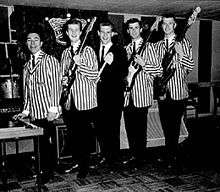 1963 "Louie Louie" line-up. L-R Don Gallucci, Jack Ely, Lynn Easton, Mike Mitchell, and Bob Nordby | |
| Background information | |
| Origin | Portland, Oregon, United States |
| Genres | |
| Years active | 1959–present |
| Labels | Jerden, Wand, Sundazed |
| Website | www.louielouie.org |
| Members | Mike Mitchell Dick Peterson Kim Nicklaus Steve Peterson Todd McPherson Dennis Mitchell |
| Past members | Lynn Easton Jack Ely Bob Nordby Don Gallucci Gary Abbott Norm Sundholm Barry Curtis Kerry Magness J.C. Reick Turley Richards Pete Borg Jeff Beals Steve Friedson Yank Barry Jerry Miller Fred Dennis Andy Parypa Marc Willett |
In total, the Kingsmen charted 11 single releases from 1963 to 1968 and five consecutive albums from 1963 to 1966. Their first album, The Kingsmen in Person, remained on the Billboard Top LPs chart for 131 weeks from January 1964 to August 1966. Their early albums were released internationally in Canada, the UK, France, Germany, Mexico, South Africa, and Taiwan.
Early years
In 1957, Lynn Easton invited Jack Ely to play with him at a Portland Hotel gig, with Ely singing and playing guitar and Easton on the drum kit.[1] The two teenagers had grown up together, as their parents were close friends.[1] Easton and Ely performed at local parties and events, and soon added Mike Mitchell on guitar and Bob Nordby on bass to round out the band. They called themselves the Kingsmen, taking the name from a recently disbanded group.[2] The Kingsmen began their collective career playing at fashion shows, Red Cross events, and supermarket promotions, generally avoiding rock songs on their setlist.[3] In 1962, Don Gallucci, a high school freshman at the time, was recruited from another local group, the Royal Notes, to play keyboards.[4]
"Louie Louie"
In 1962, while playing a gig at the Pypo Club in Seaside, Oregon, then managed by Al Dardis, the band noticed Rockin' Robin Roberts's version of "Louie Louie" being played on the jukebox for hours on end. The entire club would get up and dance.[5] Ely convinced the Kingsmen to learn the song, which they played at dances to a great crowd response.[6] Unknown to him, he changed the beat because he misheard it on a jukebox.[7] Ken Chase, host of radio station KISN, formed his own club to capitalize on these dance crazes.[8] Dubbed the "Chase", the Kingsmen became the club's house band and Ken Chase became the band's manager. On April 5, 1963, Chase booked the band an hour-long session at the local Northwestern Inc. studio for the following day.[9] The band had just played a 90-minute "Louie Louie" marathon.[10]
Despite the band's annoyance at having so little time to prepare, on April 6 at 10 am the Kingsmen walked into the three-microphone recording studio. To sound like a live performance, Ely was forced to lean back and sing to a microphone suspended from the ceiling. "It was more yelling than singing," Ely said, "'cause I was trying to be heard over all the instruments."[9] In addition, he was wearing braces at the time of the performance, further compounding his infamously slurred words.[11] Ely sang the beginning of the third verse several bars too early, but realized his mistake and waited for the rest of the band to catch up. In what was thought to be a warm-up, the song was recorded in its first and only take. The Kingsmen were not proud of the version, but their manager liked the rawness of their cover.[12] The B-side was "Haunted Castle", composed by Ely and Don Gallucci, the new keyboardist.[13] However, Lynn Easton was credited on both the Jerden and Wand releases. The entire session cost $50, and the band split the cost.[12]
"Louie Louie" was kept from the top spot on the charts in late 1963 and early 1964 by the Singing Nun and Bobby Vinton, who monopolized the No. 1 slot for four weeks apiece. The Kingsmen single reached No. 1 on the Cashbox chart and No. 2 on the Billboard Hot 100 chart. Additionally it reached No. 1 on the CHUM Canada chart and in the UK it reached No. 26 on the Record Retailer chart. It sold over one million copies, and was awarded a gold disc.[14] Wand issued a re-release in 1966 as "Louie Louie 64-65-66" and it re-entered the Billboard Hot 100 at No. 97.
The band attracted nationwide attention when "Louie Louie" was banned by the governor of Indiana, Matthew E. Welsh, also attracting the attention of the FBI because of alleged indecent lyrics in their version of the song. The lyrics were, in fact, innocent, but Ely's baffling enunciation permitted teenage fans and concerned parents alike to imagine the most scandalous obscenities. All of this attention only made the song more popular. In April 1966 "Louie Louie" was reissued and once again hit the music charts, reaching No. 65 on the Cashbox chart and No. 97 on the Billboard Hot 100 chart.
In 1985, Ross Shafer, host and a writer-performer of the late-night comedy series Almost Live! on the Seattle TV station KING, spearheaded an effort to have "Louie Louie" replace "Washington, My Home" by Helen Davis as Washington's official state song.[15] Picking up on this initially prankish effort, Whatcom County Councilman Craig Cole introduced Resolution No. 85-12 in the state legislature, citing the need for a "contemporary theme song that can be used to engender a sense of pride and community, and in the enhancement of tourism and economic development". His resolution also called for the creation of a new "Louie Louie County". While the House did not pass it, the Senate's Resolution 1985-37 declared April 12, 1985, "Louie Louie Day". A crowd of 4,000, estimated by press reports, convened at the state capitol that day for speeches, singalongs, and performances by the Wailers, the Kingsmen, and Paul Revere and the Raiders. Two days later, a Seattle event commemorated the occasion with the premiere performance of a new, Washington-centric version of the song written by composer Berry.[16]
Over the years the Kingsmen's version of "Louie Louie" has been recognized by organizations and publications worldwide for its influence on the history of rock and roll. Rankings and recognition in major publications and surveys are shown in the table below.
| Source | Poll/Survey | Year | Rank |
| Rock & Roll Hall of Fame | Hall of Fame Singles | 2018 | None |
| Rock & Roll Hall of Fame | Songs That Shaped Rock and Roll | 1995 | None |
| National Academy of Recording Arts and Sciences | Grammy Hall of Fame | 1999 | None |
| National Public Radio | The 300 Most Important American Records of the 20th Century | 1999 | None |
| The Wire Magazine | The 100 Most Important Records Ever Made | 1992 | None |
| Mojo Magazine | Ultimate Jukebox: The 100 Singles You Must Own | 2003 | #1 |
| Paste Magazine | The 50 Best Garage Rock Songs of All Time | 2014 | # 3 |
| Rolling Stone | 40 Songs That Changed The World | 2007 | #5 |
| All Time Top 1000 Albums, Colin Larkin | The All-Time Top 100 Singles | 2000 | #6 |
| VH1 | 100 Greatest Songs of Rock and Roll | 2007 | #11 |
| The Heart of Rock and Soul, Dave Marsh | The 1001 Greatest Singles Ever Made | 1989 | #11 |
| Rolling Stone | The 100 Best Singles of the Last 25 Years | 1989 | #18 |
| VH1 | 100 Greatest Dance Songs | 2000 | #27 |
| Mojo Magazine | 100 Greatest Singles of All Time | 1997 | #51 |
| Rolling Stone | The 500 Greatest Songs of All Time | 2004 | #54 |
| NEA and RIAA | Songs of the Century | 1999 | #57 |
| Mojo Magazine | Big Bangs: 100 Records That Changed The World | 2007 | #70 |
| Pitchfork Magazine | The 200 Best Songs of the 1960s | 2006 | #154 |
| NME Magazine | The 500 Greatest Songs of All Time | 2014 | #157 |
| WCBS-FM | Top 1001 Songs of the Century | 2005 | #184 |
Kingsmen history
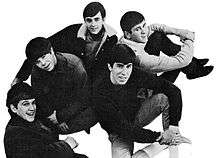
Before the success of "Louie Louie", the members of the Kingsmen took varied paths. Easton, whose mother had registered the name of the group and therefore owned it, declared that from this point on he intended to be the singer, forcing Ely to play the drums. This led Jack Ely and Bob Nordby to quit the group in 1963, and Gary Abbott and Norm Sundholm were added to play drums and bass, respectively.[17]
Don Gallucci was forced out because he wasn't old enough to tour and later formed Don and the Goodtimes, which morphed into the short-lived Touch.[18] Later, Gallucci became a record producer with Elektra Records, with his most famous production being the Stooges' seminal second album Fun House. ("Louie Louie" was frequently performed at Stooges concerts; the song appears on their live album as well as an Iggy Pop solo record.)
The two remaining original Kingsmen, Lynn Easton and Mike Mitchell, were joined by Gary Abbott, Barry Curtis and Norm Sundholm to record their first album and tour as the official band. Dick Peterson replaced Gary Abbott shortly thereafter. This line-up stayed intact from 1964 into 1966 and charted multiple singles and albums with Easton as the principal vocalist.
After Ely's departure and considerable chart success by the new line-up, the group learned that he was performing with another group as The Kingsmen.[19] Following legal action, a settlement was reached and Easton, Mitchell, Peterson, Curtis and Sundholm established their rights to the "Kingsmen" name. Thus, Ely was forced to stop using the name, Easton was forced to stop lip syncing to Ely's vocals, and subsequent releases of "Louie Louie" were required to have the text "Lead vocal by Jack Ely" below the title. Unable to perform using the Kingsmen name, Ely continued with his groups the Squires and the Courtmen. He also received a gold record for "Louie Louie" as part of the settlement.[20][21][22]
The Kingsmen's 1964 follow up to "Louie Louie" was a party version of "Money (That's What I Want)" which hit the Billboard Hot 100 at No. 16 and on Cashbox at No. 17. Then came "Little Latin Lupe Lu" peaking on Billboard at No. 46 and Cashbox at No. 49. After that it was "Death of An Angel" No. 33 on Cashbox and No. 42 on Billboard.
1965 saw the Kingsmen return to the Top 10 nationally with "The Jolly Green Giant" reaching No. 4 on Billboard and No. 8 on Cashbox. The novelty number also made No. 25 on the Billboard R&B chart and hit No. 1 on the RPM Canada chart. The follow-up song was "The Climb", No. 45 on Cashbox and No. 65 on Billboard. "Annie Fanny" was released next reaching No. 43 on Cashbox and No. 47 on Billboard. Next came "(You Got) The Gamma Goochee", No. 98 on Cashbox and No. 122 on Billboard. The group also appeared in the beach party movie How to Stuff a Wild Bikini singing "Give Her Lovin'" ("Annie Fanny"'s B-Side) which appeared on the soundtrack album along with their recording of the title song.
In 1966 the Kingsmen continued to hit the charts with "Killer Joe" reaching No. 77 on Billboard and No. 81 on Cashbox. Their original recording of "Louie Louie" was re-released as "Louie Louie 64-65-66" and re-entered the Billboard chart at No. 97. In 1967 they made the chart for the last time with "Bo Diddley Bach" reaching No. 128 on Billboard.
Lynn Easton left the group in 1967. He worked for an advertising firm and hosted a "bandstand-type" show for a Portland television station.[23]
In late 1968 with the original group on a recording and touring hiatus, the Kingsmen's management team worked with the Kasenetz-Katz production organization and studio musicians to release a single on the Earth label ("Feed Me"/"Just A 'B' Side").[24] A separate lineup was formed with new members (including lead singer Yank Barry) to tour for a time during 1968–1969 on the East Coast of the United States while the main lineup of the band was on hiatus.[25][26][27]
In 1973 the reactivated group signed with Capitol and released one single which did not chart.[28][29]
On November 9, 1998, the Kingsmen were awarded ownership of all their early recordings released on Wand Records from Gusto Records, including "Louie Louie". They had not been paid royalties on the songs since the 1960s.[30][31][32]
On June 25, 2019, The New York Times Magazine listed The Kingsmen among hundreds of artists whose material was reportedly destroyed in the 2008 Universal fire.[33]
Members
Current Members
- Mike Mitchell – vocals, guitar (1959–present)
- Dick Peterson – drums (1963–present)
- Steve Peterson – keyboards (1988–present)
- Kim Nicklaus – keyboards (1982–1984, 2000–present)
- Todd McPherson – bass (1992–present)
- Dennis Mitchell – guitar (2006–present)
Former Members
- Lynn Easton – vocals, drums, saxophone (1959–1967) (died 2020)[4]
- Jack Ely – vocals, guitar (1959–1963) (died 2015)[34]
- Bob Nordby – bass (1959–1963)
- Don Gallucci – keyboards (1962–1963)
- Gary Abbott – drums (1963)
- Norm Sundholm – bass (1963–1967)
- Barry Curtis – keyboards (1963–2005)
- Kerry Magness – bass (1966–1967) (died 2004)[35]
- J.C. Rieck – keyboards, vocals (1966–1967) (died 2019)[36]
- Turley Richards – vocals, guitar (1967)
- Pete Borg – bass (1967)
- Jeff Beals – bass (1967–1968)
- Steve Friedson – keyboards (1967–1973)
- Yank Barry – vocals (1968–1969)[37][27]
- Fred Dennis – bass (1972–1984)
- Andy Parypa – bass (1982–1984)
- Marc Willett – bass (1984–1992)
Timeline
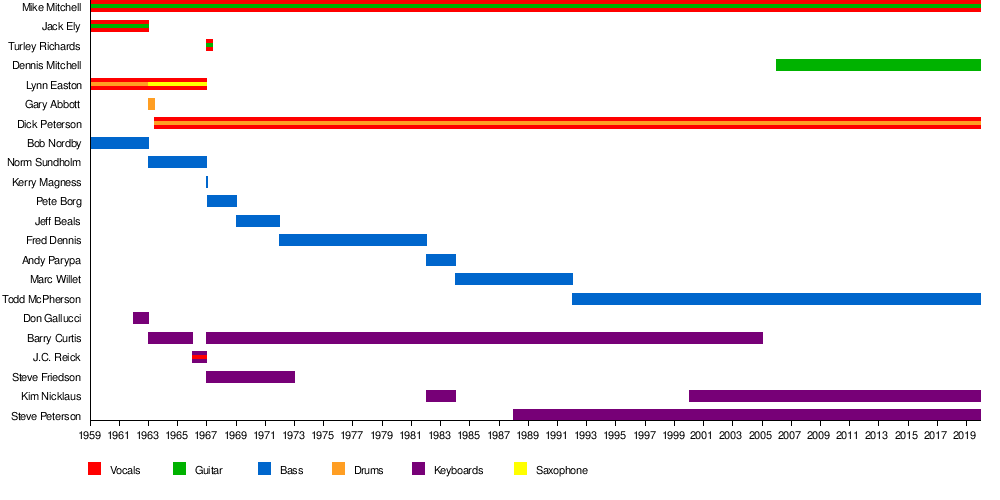
Discography
U.S. singles and albums, plus major compilation releases.
Albums
Listed in chronological order with peak chart position (Billboard) noted.
- The Kingsmen in Person (Wand WDM/WDS-657) 1963 (#20)
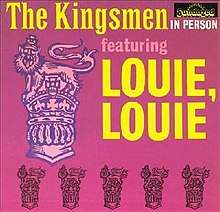 First Kingsmen LP (1963)
First Kingsmen LP (1963) - The Kingsmen Volume II (Wand WDM/WDS-659) 1964 (#15)
- The Kingsmen Volume 3 (Wand WDM/WDS-662) 1965 (#22)
- The Kingsmen on Campus (Wand WDM/WDS-670) 1965 (#68)
- 15 Great Hits (Wand WDM/WDS-674) 1966 (#87)
- Up and Away (Wand WDM/WDS-675) 1966
- A Quarter to Three (Picc-A-Dilly PIC-3329) 1980
- Ya Ya (Picc-A-Dilly PIC-3330) 1980
- House Party (Picc-A-Dilly PIC-3346) 1980
- Louie Louie – Live & Unreleased (Jerden 7004) recorded 1963, released 1992
- Since We’ve Been Gone (Sundazed 6027) recorded 1967, released 1994
- The Kingsmen – Plugged (Kingsmen CD 1) 1995
- Garage Sale (Louie Louie Records) 2003
- Live At The Castle (Spotify, digital only, recorded 1964, released 2011)
Compilation albums
- The Kingsmen Greatest Hits (Wand WDM/WDS-681) 1967
- The Best of the Kingsmen (Scepter/Citation Series CTN-18002) 1972
- The Kingsmen Greatest Hits (Picc-A-Dilly PIC-3348) 1981
- The Best of the Kingsmen (Rhino RNLP 126) 1985
- Rock & Roll – Kingsmen (Starday N5-2125) 1985
- Louie Louie – The Kingsmen (Prime Cuts 1322) 1986
- The Kingsmen – 12 Greatest (Golden Circle CS 57582) 198?
- The Kingsmen – Louie, Louie (Golden Circle GC57881) 1987
- The Jolly Green Giant (Richmond 2125) 1988
- The Kingsmen – Louie Louie (Highland Music/Richmond 2138) 1988
- The Best of the Kingsmen (Rhino 70745) 1989
- The Kingsmen – Louie Louie and More Golden Classics (Collectables 5073) 1991
- The Kingsmen – 20 Greats (Highland Music/Festival FST FCD 4417) 1991
- The World of the Kingsmen/Louie Louie (Trace 0400612) 1992
- The Best of the Kingsmen (Laserlight/Delta 124 24) 1995
- The Very Best of the Kingsmen (Varese Sarabande/Varese Vintage 5905) 1998
- The Kingsmen's Greatest Hits (K-tel K4185-2) 1998
- Louie Louie: The Very Best of the Kingsmen (Collectables 5628) 1999
- The Kingsmen – America's Premier 60s Garage Band (Edel America 70172) 2000
- The Kingsmen – Gold (N'Dagroove Records NDA5331, 2012)
Singles

Listed in chronological release order with peak chart position (Billboard hot 100) noted.
- "Louie Louie" / "Haunted Castle" (Jerden 712) 1963)
- "Louie Louie" / "Haunted Castle" (Wand 143) 1963 (#2) – B-side changed to Little Green Thing on later pressings; Re-released in 1966 as Louie Louie 64-65-66 w/ Haunted Castle B-side
- "Money" / "Bent Scepter" (Wand 150) 1964 (#16)
- "Little Latin Lupe Lu" / "David's Mood" (Wand 157) 1964 (#46)
- "Death of An Angel" / "Searching for Love" (Wand 164) 1964 (#42)
- "The Jolly Green Giant" / "Long Green" (Wand 172) 1964 (#4)
- "The Climb" / "The Waiting" (Wand 183) 1965 (#65)
- "Annie Fanny" / "Give Her Lovin’" (Wand 189) 1965 (#47)
- "(You Got) The Gamma Goochee" / "It's Only The Dog" (Wand 1107) 1965 (#122)
- "Killer Joe" / "Little Green Thing" (Wand 1115) 1966 (#77)
- "The Krunch" / "The Climb" (Wand 1118) 1966
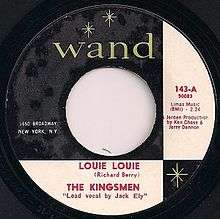 Wand 143: Second release with "Lead vocal by Jack Ely" text
Wand 143: Second release with "Lead vocal by Jack Ely" text - "Little Sally Tease" / "My Wife Can't Cook" (Wand 1127) 1966
- "If I Needed Someone" / "Grass Is Green" (Wand 1137) 1966
- "Trouble" / "Daytime Shadows" (Wand 1147) 1967
- "Children's Caretaker" / "The Wolf of Manhattan" (Wand 1154) 1967
- "Don't Say No" / "(I Have Found) Another Girl" (Wand 1157) 1967
- "Bo Diddley Bach" / "Just Before The Break of Day" (Wand 1164) 1968 (#128)
- "Get Out of My Life Woman" / "Since You’ve Been Gone" (Wand 1174) 1968
- "On Love" / "I Guess I Was Dreamin’" (Wand 1180) 1968
- "You Better Do Right" / "Today" (Capitol 3576) 1973
Appearances (1960s releases)
- Original Great Northwest Hits, Volume 1 (Jerden JRL 7001, 1964) – "Louie Louie"
- Original Great Northwest Hits, Volume 2 (Jerden JRL 7002, 1964) – "J.A.J."
- The Groups are the Greatest – The Greatest of the Groups (Scepter 518, 1964) – "Louie Louie", "Money", "Bent Scepter"
- Murray The K – The Fifth Beatle Gives You Their Golden Gassers (Scepter 524, 1964) – "Louie Louie", "Money"
- The Greatest on Stage (Wand 661, 1965) – "David's Mood", "Money", "Louie Louie"
- How to Stuff a Wild Bikini soundtrack (Wand 671, 1965) – "Give Her Lovin'", "How to Stuff a Wild Bikini"
- The Hitmakers (Jerden JRL 7005, 1965) – "Twist and Shout", "All the Little Animals"
- KHJ Boss Goldens, Volume 1 (Original Sound KHJ 9365, 1965) – "The Jolly Green Giant"
- Wolfman's Favorite Oldies (Scepter 564, 1967) – "Louie Louie", "Killer Joe"
- Battle of the Bands, Volume 2 (Panorama 109, 1967) – "C.C. Rider"
Other uses of the name
Prior to this group's formation, another group called The Kingsmen operated in 1958 and was made up of members of Bill Haley & His Comets who were moonlighting from their regular work with Haley. This group scored a hit record (#35) on Billboard with the instrumental entitled "Week End", written by Rudy Pompilli, Franny Beecher, and Billy Williamson, backed with "Better Believe It" as the B side. They released a follow-up single on East West Records featuring "The Catwalk" backed with "Conga Rock". Although the Comets did the actual recordings, when the Kingsmen went on tour a different set of musicians performed instead of Haley's people. The band made at least one appearance on American Bandstand in 1958.
Many other groups have used the name "The Kingsmen", including a gospel vocal group formed in 1956 (also referred to as The Kingsmen Quartet), and bands that were later renamed as Flamin' Groovies, The Gants and The Statler Brothers. An a cappella group at Columbia University is traditionally known as the Kingsmen; former members include Art Garfunkel and the original lineup of Sha Na Na.[38]
Further reading
- Marsh, Dave (1993). Louie Louie: The History and Mythology of the World's Most Famous Rock 'n' Roll Song. New York City: Hyperion Books. ISBN 1562828657.
- Blecha, Peter (2009). Sonic Boom! The History of Northwest Rock: From Louie Louie to Smells Like Teen Spirit. Milwaukee, Wisconsin: Backbeat Books. ISBN 0879309466.
- Peterson, Dick (2005). Louie Louie: Me Gotta Go Now. Sherwood, Oregon: Thalian Press. ISBN 1420856103.
- Ace Records (UK); 'Love that Louie' CD sleevenotes.
- Rhino Records; 'The Best of Louie Louie' CD sleevenotes.
- Renaissance Records; 'Touch' CD sleevenotes.
References
- Marsh 1993, p. 85
- Marsh 1993, p. 86
- Marsh 1993, p. 87
- Predoehl, Eric (April 28, 2020). "RIP: Lynn Easton of the Kingsmen". The Louie Report.
- Blecha 2009, p. 134
- Blecha 2009, p. 135
- Marsh 1993, p. 83
- Blecha 2009, p. 136
- Blecha 2009, p. 137
- Marsh 1993, p. 88
- Hayes, Ron (August 13, 1993). "Rock's Rumored Dirtiest Song Turns 30". Lewiston Morning Tribune. Retrieved July 19, 2012.
- Blecha 2009, p. 138
- Blecha 2009, p. 136.
- Murrells, Joseph (1978). The Book of Golden Discs (2nd ed.). London: Barrie and Jenkins Ltd. p. 161. ISBN 0-214-20512-6.
- Seattle Weekly (October 27, 1999) Music: "The State I'm In" Archived August 21, 2006, at the Wayback Machine, by Kurt B. Reighley
- Liner notes, The Best Of Louie Louie Volume 2 (Rhino R1 70515), by Doc Pelzell
- "Artists' Biographies – The Kingsmen" (PDF). Billboard. December 14, 1963. Retrieved May 15, 2019.
- "Producer's Profile – Don Gallucci" (PDF). Cash Box magazine. October 10, 1979. Retrieved May 13, 2019.
- Peterson 2005, p. 325.
- Peterson 2005, p. 327.
- "Settle Kingsmen vs Jack Ely Litigation" (PDF). Cash Box magazine. February 2, 1966.
- "Court Tells Ely & Kingsmen to Use a Different Billing" (PDF). Billboard. February 12, 1966. Retrieved May 15, 2019.
- "Giant Easton Launches Weekly Seg on KGW-TV" (PDF). Billboard. October 28, 1967. Retrieved May 15, 2019.
- Released on Earth 104. Lead singers were C. L. Weldon on "Feed Me" and Joey Levine on "Just A 'B' Side".
- "Kingsmen web site historical page". Archived from the original on March 16, 2011. Retrieved May 29, 2014.
- O'Connor, Joe (April 15, 2012). "The world according to Yank: Montrealer with checkered past gets Nobel nod, or does he?". National Post. Retrieved January 21, 2017.
- "National Post clarification: Yank Barry". National Post. January 6, 2017. Retrieved May 13, 2019.
- "Kingsmen to Capitol" (PDF). Cash Box magazine. March 24, 1973. Retrieved May 13, 2019.
- "Picks of the Week" (PDF). Cash Box magazine. March 31, 1973. Retrieved May 15, 2019.
- Morris, Chris (July 8, 1995). "Kingsmen to Reclaim Master Recordings" (PDF). Billboard. Retrieved May 15, 2019.
- Holland, Bill (November 21, 1998). "Kingsmen Prevail in Contract Suit" (PDF). Billboard. Retrieved May 15, 2019.
- "Louielouie.org". Archived from the original on July 19, 2006. Retrieved October 10, 2006.
- Rosen, Jody (June 25, 2019). "Here Are Hundreds More Artists Whose Tapes Were Destroyed in the UMG Fire". The New York Times. Retrieved June 28, 2019.
- "Jack Brown 'Louie Louie' Ely". The Bend Bulletin. May 5, 2015. Retrieved May 12, 2015.
- Predoehl, Eric (July 4, 2005). "RIP: Kerry Magness". The Louie Report. Retrieved May 22, 2019.
- "John Rieck". Enumclaw Courier-Herald. May 21, 2019. Retrieved May 22, 2019.
- O'Connor, Joe (April 15, 2012). "The world according to Yank: Montrealer with checkered past gets Nobel nod, or does he?". National Post. Retrieved June 13, 2014.
- Peterson, Susan (July 15, 1978). "Woodstock to Prime Time – A 10 Year Rock Odessey" (PDF). Billboard. Retrieved May 15, 2019.